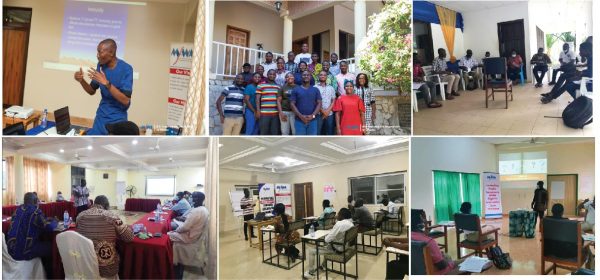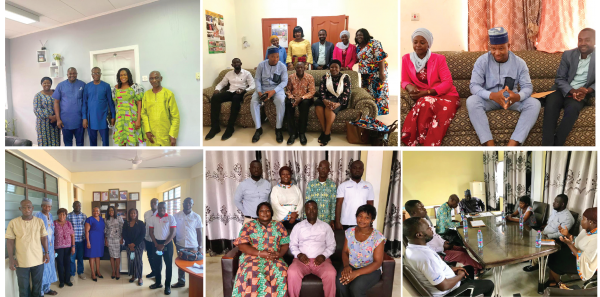Deepening Access to Information for Accountable Governance in Ghana – The MFWA Experience
Access to information is a universal human right. Accordingly, it is recognised in several international human rights treaties and protocols such as the Universal Declaration of Human Rights, the International Covenant on Civil and Political Rights and the African Charter on Human and Peoples’ Rights. These instruments place obligations on States that have ratified them to respect, protect and fulfil citizens’ enjoyment of the right to information.
Access to public-held information is also a critical tool for attaining the key indicators of good governance i.e. participation, transparency and accountability among others. It strengthens and institutionalises mechanisms for citizens-government engagements on development issues that affect their lives. It empowers citizens to demand transparency and accountability on matters of public interest thereby holding governments and public office holders accountable for their stewardship.
Ghana is a signatory to these international and regional instruments and protocols. Accordingly, the 1992 Constitution and the recently passed Right to Information law (Act 989) grant citizens the full enjoyment of this right. Sadly, however, the mere existence of an RTI law does not guarantee citizen participation, state accountability and state responsiveness. The law is almost needless without real structural mechanisms and political will to provide information, and the ability of citizens to claim their right to information and to use it to demand better governance and public services.
In view of this, the Media Foundation for West Africa (MFWA), since the passage of the RTI law in 2019, has been implementing a series of activities to sensitize and promote public awareness and engagement on the RTI law in Ghana. Below are some key specific interventions undertaken by the organization.
- Capacity building and sensitisation on the RTI law
According to Alianza Regional (2009)[1], lack of training on access to information is one of the major obstacles to its effective implementation. This is because users need to know and understand the law, as well as their rights and obligations under the law in order to effectively evoke it. The MFWA in this regard has organised several sensitisation programmes, capacity building and training sessions for journalists and public officials across Ghana. In 2019, for instance, the organisation trained over 150 journalists from the Ashanti, Northern and Greater Accra regions on how to utilise the RTI law for critical reporting. In 2021, the organization brought together some 15 investigative journalists in a three-day residential bootcamp to equip them with skills and knowledge on how to use the RTI law to advance their investigations. To also improve local governance accountability, the MFWA has trained 30 journalists from community-based radio stations in some parts of the country on the RTI law, information request processes and how they can seek information to facilitate more detailed and factual reporting. About 150 local government officials made up of Metropolitan, Municipal and District Chief Executives, Coordinating Directors and Information Officers from various Metropolitan Municipal and District Assemblies (MMDAs) have also been trained on their obligations under the law. The aim has been to empower both the demand and supply sides of governance of their responsibilities and obligations under the RTI law.
2. Publication of a simplified version of the RTI Law
To make the RTI law user friendly for the media and the public in general, the MFWA, with support from the DW Akademie, produced and published a Journalists Guidebook on the law. Titled Essentials of the RTI Law, the guidebook helps readers highlights key areas of the law such as exempt information; information request process; the appeal process etc. So far, over 500 copies of the Guidebook have been distributed to newsrooms, media organisations and some public institutions across Ghana. A copy of the Guidebook is also available online for easy access.

- Sensitization Forums for Media and the Public
To encourage public participation and usage of the right to information law among citizens, the MFWA periodically organises national forums on the law. These forums usually bring together high-profile lawyers, journalists, representatives of the government, the media, citizens and other key stakeholders to discuss these topical issues such as government efforts to ensure an effective RTI regime; how the law can engender Ghana’s fight against corruption; as well as emerging trends and challenges. These Forums harvest key recommendations towards ensuring a more robust access to information regime in Ghana.

4. Gauging Public Institutions Responsiveness to Making Information Request
Between September 2020 and June 2021, the MFWA has made over 30 requests to some public institutions in Ghana. The outcomes of these requests have triggered reactions that have questioned some of the tenets of the RTI law and called for a look at some grey areas within the law. For instance, in 2020, the MFWA requested information from the National Communications Authority which demanded an exorbitant amount of Ghc2,000 to enable it “research” the information. In a related development, the Minerals Commission of Ghana asked The Fourth Estate, a public interest and accountability investigative journalism project of the MFWA, to pay approximately US$1,000 for information that ordinarily should be public information.

So far, demands for fees and charges before the released of information to an applicant have been a major problem that calls for policy directions on the issue. To ensure a holistic implementation of the Right to Information law, the MFWA has held engagements with the RTI Commission on best ways to address some of these issues.

[1] https://www.palermo.edu/cele/pdf/noticias/AI-training-final.pdf
